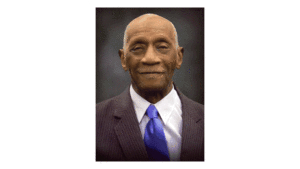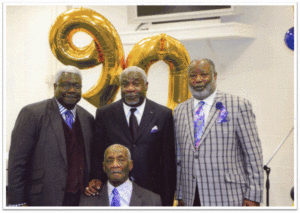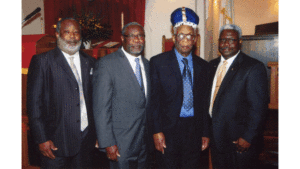
Richard G. Stewart Sr. (1926-2018)
By Richard G. Stewart Jr.
(Aug. 1) – Richard G. Stewart, Sr. was a member of the Greatest Generation, World War II veteran, breaker of racial barriers, entrepreneur and community organizer. Thurgood Marshall and Constance Baker Motley called him their client.
My two brothers – Chief Judge Carl E. Stewart of the U.S. Court of Appeals for the Fifth Circuit and Caddo Parish District Attorney James E. Stewart of Shreveport, LA, and I have another title for him: Dad.
Less than four months ago – on April 12, 2018 – our father died only three weeks after we celebrated his 92nd birthday. The impact he had on us and legacy he left behind is extraordinary. This is our tribute to him.
Dad was a man of the highest integrity whose many contributions benefited the Stewart family as well as the Shreveport community. He survived the Depression as a child with his parents, Wesley and Ollie Stewart, along with his older brother Wesley Jr.
Dad graduated from Central Colored High School in 1943. Because of segregation, Central was the only high school for African American students in Caddo Parish, which includes Shreveport.
He was a member of the “Greatest Generation” and an honorably discharged veteran of World War II. His service in World War II included back-to-back tours in Italy and Japan. His segregated U.S. Army unit traveled by large Troop Transport ship – the USS Billy Mitchell – from Italy to Japan.
Dad said it was an arduous and frightening journey and the Billy Mitchell’s transit was only days ahead of the USS Indianapolis, which was sunk by a torpedo from a Japanese submarine. He remained in Japan until the peace treaty ending the war with Japan was signed.
Following his honorable discharge from the US Army in July 1946, he returned home and married Corine E. Kinsey of Minden, Louisiana, on September 4, 1946. Three children were born to this union.
Having served his country during time of war, Dad looked forward to raising a family and availing himself of the benefits he had earned during his military service. Our parents’ goals included acquiring a home and ensuring that their sons had an opportunity to receive college educations.

Dad was hired in 1950 as a letter carrier for the United States Postal Service, one of the first letter carriers of color in Shreveport. Literally, through rain, shine, sleet, and snow, he walked many hills and alleys throughout the Lakeside and Allendale communities to deliver mail on time. Delivering the mail was a service to him, and he consistently delivered smiles and encouraging words to generations of young and old.
He also regularly checked report cards of neighborhood students and emphasized that their conduct grades were equally important to a successful life’s journey. Upon his passing, a number of our classmates commented that he was not only the Stewart’s dad – “he was the neighborhood Dad.”
Prior to retiring from the Post Office in 1981, he became owner and operator of Modern Cleaners, where he worked evenings and continued to serve the residents of the Lakeside and Allendale communities of Shreveport. He also prepared income tax returns for members of the community and sold appliances.
Despite his active schedule, Dad attended virtually all of our extracurricular activities, including little league sports, plays, and high school, college and law school graduations. He was equally involved in his grandkids activities.
Dad was a man of courage. In 1954, he was the lead plaintiff, along with his friend John Wilson, in a federal housing discrimination class action lawsuit: Richard G. Stewart, et al v. Clarke Terrace Unit No. 1, Inc., et al., filed in federal court in Shreveport, Louisiana.
Two amazing lawyers represented our father in the litigation: Constance Baker Motley, who subsequently became the nation’s first African American woman federal judge, and the Honorable Thurgood Marshal, who later was appointed to the U.S. Supreme Court by President Lyndon Johnson.
Unlike his fellow WW II veterans, and because of Jim Crow Laws, he was prohibited from using the GI Bill to purchase a home in a new subdivision. This Shreveport housing discrimination case included one hundred “Negro” plaintiffs. These plaintiffs had entered into agreements to purchase lots for new homes in the Clark Terrance subdivision. Many of them, like Dad, were veterans and postal employees.
The local governing entities – mayor, city council and parish commission along with members of Emmanuel Baptist Church and a white civic group acted in concert to oppose this development for middle class Negroes, because it was too close to their residences and businesses. Moreover, the city indicated it would not extend public utilities, such as water and electricity to this new development and the sheriff stated he would not provide law enforcement protection for Negro residents in this development.
Unfortunately, the case was dismissed for lack of jurisdiction. We all looked forward to having a new home and our Mother was devastated when the lawsuit was dismissed. Dad’s lawsuit, which was likely one of the first of its kind is chronicled in “A More Noble Cause, A.P. Tureaud and the Struggle for Civil Rights in Louisiana,” by Rachel L. Emanuel and A.P. Tureaud, Jr.
Further, this was at a time when initiating such actions against the status quo was risky and could jeopardize one’s employment or even life.
Cases like Dad’s clearly demonstrated the need for enactment or fair housing laws. It is indeed ironic that at a time when “separate but equal” was the law of the land, the local white citizenry concluded that these new homes were too good for Negroes.

Dad was an avid supporter of enhancing educational opportunities for all children. He served several terms as President of the Parent Teacher Association in our schools, and served as President of the District PTA. He was a founding member of the Centralites of 1943 Class Reunion Organization and served as the first President of the National Centralites Reunion Organization, an alumni association of Central Colored High School. Under his leadership, the National Centralites provided scholarships and other educational assistance to deserving students.
He also led a successful effort to have Central Colored High School included on the National Registry of Historic Buildings. In the 1970’s, he served on the Caddo Parish Citizens Jail Committee.
Our Mother passed in 1978. Dad never remarried.
I am often asked if the three of us attended law school because of Dad’s influence or directives. Dad never attempted to tell us what to be. His only mandate was to do well in school. He also told us that things were changing and he was confident the barriers imposed by segregation would soon be dismantled. He also encouraged us to pursue any field of endeavor of our choosing.
Dad was adamant that we should not avoid professions that historically barred blacks. Nevertheless, I am convinced our life experiences growing up in Shreveport, segregated schools, separate lunch counters, sitting in the back of the bus and being required to sit in the balcony in the Strand Theater, as well as Dad’s lawsuit played a role in our decisions to attend law school.
There were even stores in Shreveport that would not allow our Mother to try on clothes before purchase – based on the theory that “no respectful white woman would purchase a dress that had been worn by a Negro.”
During my senior year of college, I received acceptance letters to several graduate and law schools. State University of New York – Brockport offered a full ride, including tuition, room, board and a stipend. I was tempted to accept this grad-school offer, in part because of the money. With two brothers behind me in school, this was indeed an attractive officer.
Fortunately, I talked to Dad first and he advised that if I really wanted to attend law school, he was confident we would come up with financing. As usual, he was right. I declined the graduate school offer and later received sufficient financial assistance to attend law school.
During his retirement years, he continued to support a variety of church, civic and charitable projects, including driving senior citizens to appointments. He was a hands on participant in my brothers’ and niece’s judicial campaigns and loved to say that he never lost an election.
Dad also had the opportunity to attend numerous college and law school graduations. He loved his grandchildren, including now Shreveport District Judge Karelia R. Stewart, New York actress Tanesha Shyvonne Stewart, Portland engineer James E Stewart, Jr, Atlanta musician Kyle Stewart and former NFL player Jonathan M. Stewart. Our father frequently chauffeured his grandchildren to their after school practices and rehearsals.
He was a faithful member of St. James United Methodist Church for over ninety years, where he was a member of the choir, finance committee, trustees, and several mission and ministry outreach projects as well as a long term delegate to the Louisiana United Methodist Annual Conference, after the Methodist Church integrated in 1968. He was also a longtime supporter of the Norwela Council Boy Scouts of America and has two grandsons who are Eagle Scouts.
His lifelong commitment to humanity was highlighted by receipt of an Honorary Doctor of Humane Letters Degree from Centenary College of Louisiana in 2013.
Richard G. Stewart, Jr, is a retired Captain Judge Advocate General’s Corps, U.S. Navy (Ret) and a retired Assistant General Counsel at Verizon Communications.
